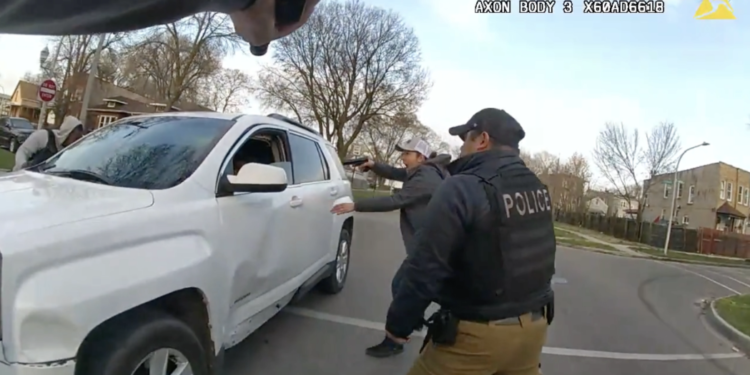March 28, 2025 Story by: Editor
The number of traffic stops conducted by Chicago police declined last year after the fatal shooting of Dexter Reed sparked widespread outrage and calls for reform. However, a joint investigation by the Chicago Sun-Times and the Investigative Project on Race and Equity has found that while stops decreased, incidents of police force during traffic stops surged.
According to police records, officers used force 787 times during traffic stops in 2023—the highest number since 2018, when stricter reporting requirements were implemented.
At the same time, more than 200,000 traffic stops were seemingly unreported to state officials, despite a 2003 law championed by then-state Senator Barack Obama requiring such data collection.
Increased Pressure on Officers Leads to Riskier Stops
Chicago Police Department (CPD) leaders have previously pushed officers to increase their stop numbers, a strategy that has put both officers and civilians at greater risk.
A dozen officers have been found to have used force in more than 10 traffic stops between 2018 and 2024 without facing disciplinary action. Seven of them were assigned to the Harrison District on the West Side, where Reed was shot and killed in a confrontation with police on March 21, 2024.
Despite ongoing protests, lawsuits, and Police Superintendent Larry Snelling’s pledge to reform CPD’s approach to traffic stops, little progress has been made.
Reed, a 26-year-old Black man, was pulled over on a residential street in Humboldt Park by CPD tactical officers, who then surrounded his SUV.
His family has described the stop as “pretextual,” alleging officers stopped him for a minor traffic violation as a means to investigate an unrelated crime.
Officials say Reed fired first, injuring an officer before four officers returned fire, discharging 96 rounds and striking Reed 13 times. The deadly exchange highlighted how quickly routine stops can escalate into violence.
Key Findings from the Investigation
To better understand what makes some stops more prone to violence, the Sun-Times and the Investigative Project on Race and Equity analyzed use-of-force data, interviewed officials, and reviewed court and police disciplinary records.
Some key findings include:
- Searches Based on Minor Infractions: Many drivers stopped for minor violations had their vehicles searched after officers claimed to smell marijuana or spotted open alcohol containers.
- Resistance and Flight Lead to Force: Some drivers refused to provide identification or exit their vehicles when ordered, leading to physical confrontations.
- Emergency Takedowns: Attempts to flee often resulted in aggressive arrests labeled as “emergency takedowns.”
- Racial Disparities: Between 2018 and 2024, CPD officers reported using force an average of 616 times per year during traffic stops. Nearly 85% of these incidents occurred in predominantly Black and Latino neighborhoods on the South and West Sides.
Traffic Stop Quotas and Aggressive Policing
Civil rights advocates argue that CPD’s aggressive tactics stem from internal quotas that pressure officers to increase traffic stops.
“It destroys the public’s confidence in the police and can lead to these really aggressive, violent behaviors by police officers,” said Alexandra Block, an attorney with the ACLU of Illinois. “Because they know that all their supervisors care about is numbers. You know, how many people did you stop? How many guns did you get?”
While CPD declined interview requests, a spokesperson provided a statement saying the department is working to reform traffic stop policies as part of the federal consent decree, which mandates sweeping changes to CPD’s practices.
“Traffic stops are only conducted when there is reasonable articulable suspicion that a person is committing, is about to commit, or has committed a criminal offense,” the department’s statement read.
Traffic Stops Disproportionately Affect Black and Latino Drivers
The number of traffic stops skyrocketed after CPD reduced pedestrian stops in 2015 following an ACLU lawsuit.
After reporting 86,000 stops in 2015, CPD has since averaged more than 400,000 traffic stops annually, based on state-mandated “blue card” documentation.
Despite this increase, data shows these stops have disproportionately targeted people of color and have rarely led to significant recoveries of drugs or firearms.
In 2023, CPD reported 295,846 traffic stops to state officials—a 45% drop from the previous year. However, dispatch records indicate that officers actually conducted 506,468 stops, suggesting underreporting.
The ACLU filed a lawsuit in 2023 challenging what it describes as a discriminatory “mass traffic stop program.” One of the plaintiffs, Eric Wilkins, a 54-year-old Black man, says he has been pulled over numerous times without receiving a ticket.
“Any time the police get behind me, I cringe, you know, from the past trauma,” Wilkins said. “You don’t know what’s going to happen. Today could be the day that I get killed.”
Use of Force and Controversial Officers
Some of the officers most frequently involved in use-of-force incidents during stops have histories of excessive force complaints and lawsuits.
Officer Fernando Ruiz, assigned to the Harrison District, has been involved in two on-duty shootings within eight months—one that left a man dead and another that paralyzed a suspect.
Ruiz now faces dismissal over the fatal shooting of Reginald Clay Jr. in April 2023. Body-camera footage shows Clay, 24, appearing to place his firearm on a porch just before Ruiz shot him in the chest.
In August 2022, Ruiz shot another man, Raymond Comer, after Comer reached for a gun while seated in a car. Comer, now paralyzed from the waist down, pleaded guilty to a firearm charge and was sentenced to five years in prison.
Ruiz has also been named in lawsuits related to excessive force, including a case where he was caught on video punching a handcuffed man. That lawsuit was settled for $95,000.
Traffic Stops as a Tool for Retaliation?
Some residents fear that officers may use traffic stops as a form of harassment or retaliation.
Dorothy Johnson, a 70-year-old woman, says she hesitated to report her neighbor, CPD Officer Brandon McDonald, for a verbal outburst because she feared he would pull her over for a minor traffic violation.
“I couldn’t believe, for him to be an officer of the law, that you would disrespect me,” Johnson said.
McDonald, who has faced 22 complaints and two lawsuits, reported using force in 16 traffic stops—more than any other Chicago officer.
Legal Challenges to Quotas
A pending civil lawsuit may expose allegations that CPD leaders pressured officers to meet quotas for traffic stops.
Lt. Franklin Paz filed the suit in 2021, claiming he was removed from a specialized unit after pushing back against traffic stop quotas imposed by former Deputy Chief Michael Barz.
According to Paz, Barz demanded that each officer complete at least 10 “blue cards” per day, tracking demographic data from stops.
A sergeant involved in the case testified that, when he tried to emphasize gun recoveries instead of stop numbers, Barz dismissed the concern, allegedly saying:
“F— those guns. I want blue cards.”
Barz has denied making the statement. The lawsuit is set for trial on April 14.
Reforming Traffic Stops
The ACLU’s lawsuit also alleges that CPD supervisors enforce quotas for stops.
This practice may soon face a challenge under a proposed settlement reached by Dexter Reed’s family in their lawsuit against the city.
The settlement, which includes a $1.25 million payment to Reed’s family, also seeks to “address and ideally eliminate quotas related to traffic stops,” according to family attorney Andrew M. Stroth.
However, the proposal has met resistance from pro-police members of the Chicago City Council, setting the stage for further debate on CPD’s future traffic stop policies.
Source: Chicago Sun Times
















